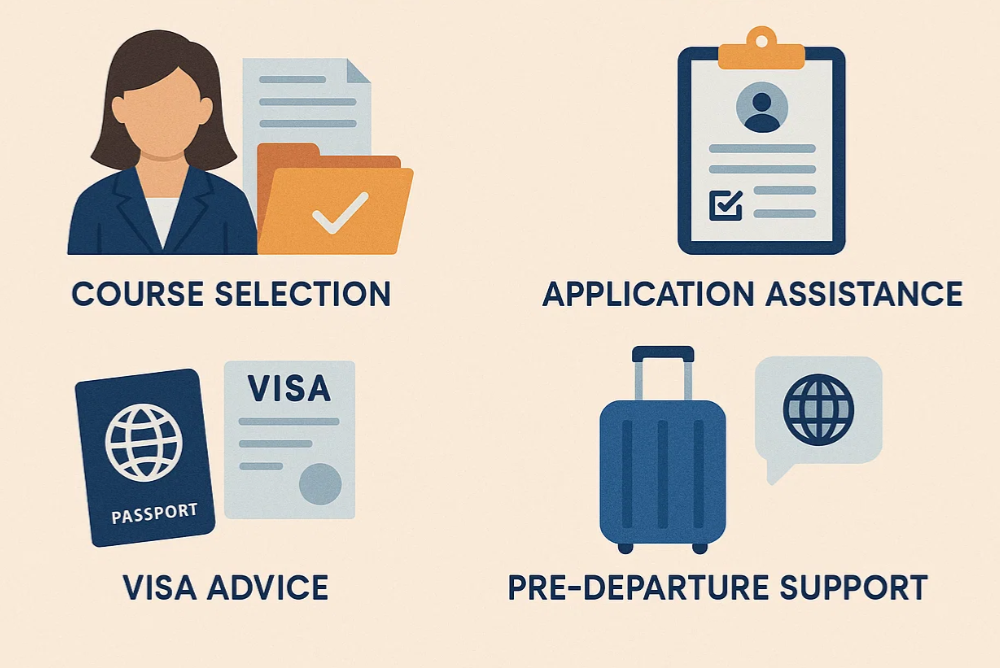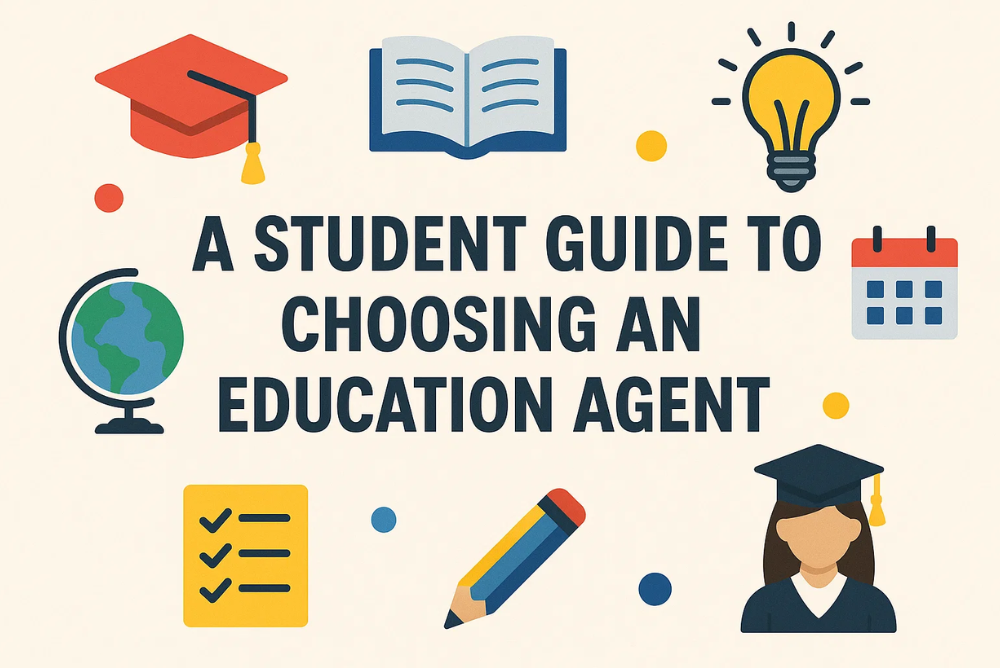Are you dreaming of studying in the United Kingdom? Whether it’s the world-class universities, vibrant multicultural cities, or the wide range of academic programmes that attract you navigating your path to UK education can feel overwhelming. That’s where a reliable education agent comes in.
In this blog, we’ll walk you through the essential steps an education agent will help you with, what to look for in a reputable agent, and the questions you should be asking before signing up. This is your guide to making one of the most important choices on your study-abroad journey.
What a Good Education Agent Will Help You With

Step 1: Decide if the UK is the Best Study Destination for You
Choosing where to study is one of the most significant decisions you will make as a student. A professional education agent plays a vital role in helping you determine whether the United Kingdom is the most suitable destination for your academic journey. They begin by getting to know your personal ambitions, academic goals, preferred learning environment, and financial situation. This understanding allows them to provide personalised advice tailored to your needs.
The UK is known for its prestigious institutions, diverse cultural atmosphere, and strong global reputation for academic excellence. However, it is essential to weigh the advantages and challenges specific to your situation. An experienced agent will present a realistic overview of what studying in the UK entails, including the quality of education, types of qualifications available, tuition fees, cost of living, visa requirements, and work opportunities during and after study.
In addition, an education agent will compare the UK with other potential destinations such as Australia, Canada, or the United States. They will explain key differences in teaching styles, course structures, length of programmes, and post-study work visa options. By discussing these options with you, the agent ensures that you are making a well-informed decision that aligns with your long-term goals.
Ultimately, the goal is not to convince you to choose the UK simply because it is popular, but to support you in making the right decision for your individual circumstances. Whether your focus is on achieving a world-class degree, building international networks, or securing global employment opportunities, your education agent will help you evaluate whether the UK is the right match for your future aspirations.
Step 2: Understand What Course Options Are Available
Whether you’re interested in Engineering, Business, Law, or the Arts, a good agent will explain what course types exist (foundation, undergraduate, postgraduate), how they’re structured, and which ones suit your qualifications and ambitions.
Step 3: Identify Institutions That Meet Your Academic and Lifestyle Preferences
Selecting the right institution is not only about academic rankings it is also about finding a place where you will thrive both intellectually and personally. Every university and college in the UK offers a unique blend of programmes, teaching styles, support services, and campus environments. A skilled education agent will take the time to understand your academic qualifications, preferred subject areas, learning style, and long-term career goals.
In addition to academic fit, lifestyle considerations play a crucial role in determining the right institution. Do you prefer the vibrant city life of London, Manchester, or Glasgow, or are you more suited to a quieter, smaller town with a close-knit campus community? Would you rather live in student halls or private accommodation? How important are extracurricular opportunities, on-campus support services, or international student clubs to you? These are all important questions your agent will help you navigate.
Budget is another key factor. Tuition fees and living expenses vary greatly across institutions and regions. A good agent will help you compare costs and identify universities that offer scholarships, bursaries, or part-time work options.
By carefully matching your academic profile and personal preferences, your education agent will help you select institutions that offer the best balance of education, experience, and lifestyle for a rewarding and successful study journey in the UK.
Step 4: Apply to Your Chosen Institutions
This includes help with application forms, deadlines, document requirements, and writing your personal statement. They’ll also keep track of your submissions and support you in managing responses from universities.
Step 5: Gather and Submit the Documents You Need for Your Visa
Applying for a student visa is one of the most critical and detailed steps in your journey to studying in the UK. A professional education agent will provide essential support throughout this process, ensuring that your application meets the expectations set by UK Visas and Immigration (UKVI).
One of the key documents you will need is the Confirmation of Acceptance for Studies (CAS), issued by your chosen institution. Your agent will guide you on how to receive this document and what details it must include. They will also help you prepare your financial evidence, which is required to prove you have sufficient funds to cover your tuition fees and living expenses in the UK.
In addition to the CAS and financial documentation, your agent will ensure your academic transcripts, English language test results (such as IELTS or equivalent), and passport information are accurate, complete, and ready for submission. They will advise on how to complete the online visa application form, book biometric appointments, and organise any necessary translations or certified copies of documents.
With their guidance, you can avoid common mistakes and delays, making the visa application process more manageable and less stressful. A reliable agent gives you peace of mind by helping you stay organised and confident every step of the way.
Step 6: Prepare to Come and Study in the UK
Support doesn’t end when you receive your visa. A quality agent will also offer pre-departure briefings, assist with travel and accommodation arrangements, and prepare you for life in the UK.
Qualifications of a Reputable Education Agent
British Council-Trained
Look for agents like Inquota who have completed the British Council Education Agent Training Programme. These agents demonstrate knowledge of the UK education system and commitment to professional standards.
Compliant with the National Code of Ethical Practice
This Code defines ethical behaviours expected of UK education agents, such as putting students first, offering honest advice, and ensuring transparent services.
How to Spot a Good Education Agent
- Are the staff professional, friendly, and helpful?
- Is the agent listed on the British Council’s website?
- Do they appear as an official representative on your preferred university’s site?
- Do they have positive reviews or testimonials from other students?
Tip: Even top-rated agents might have a few negative reviews. What matters is the overall reputation and how they handle feedback.
Key Questions to Ask Before Signing Up
Can you explain the education opportunities available in the UK?
A trained agent should walk you through study levels, entry routes, and options across England, Scotland, Wales, and Northern Ireland.
Do you comply with the UK’s National Code of Ethical Practice?
Ask to see a copy. Responsible agents will be proud to share their compliance.
Are you paid by the universities you promote?
It’s common for institutions to pay agents. That said, agents should offer unbiased advice, regardless of any commission.
Do you charge students any additional fees?
Some agents charge for extra services (like visa application help or translation). Ask for a written list of all possible fees.
Are you licensed to act as an education agent in my country?
The UK doesn’t require licences for agents, but your country might. Check with your local education ministry or consult the British Council.
Are you a registered UK immigration advisor?
Only those registered with OISC or the Law Society can give formal immigration advice. Your agent should make this clear.
When was your last training on UK visa rules?
A quality agent stays current by attending regular training sessions with UKVI, universities, and the British Council.
Can I talk to a former student you placed in the UK?
Hearing real experiences can help you understand the agent’s support quality and how things play out after you arrive in the UK.
Will you support me after I arrive?
Some agents check in with students post-arrival, assist with finding housing, and even organise networking events.
Final Reminders: You’re in Control

While agents offer valuable support, the final decision is always yours. Trust your instincts, ask questions, and don’t be pressured into making decisions you’re unsure of.
If something doesn’t feel right:
- Speak directly with the institutions you’re applying to.
- Consider switching to another agent.
- Leave reviews to help future students.
If an agent offers to:
- Hold your money
- Apply for loans
- Make tuition payments for you
Always confirm these actions with your institution directly.
Frequently Asked Questions (FAQs)
You should never feel forced into making decisions. If you’re uncomfortable, consider seeking a second opinion or contact the institution directly for guidance.
Many agents are paid by the institutions they represent, which means their basic services are often free to students. However, always ask for a full breakdown of any potential fees for additional services.
An experienced education agent plays a key role in helping you prepare a strong visa application. They ensure that all your documents are complete and in line with current UK Visas and Immigration (UKVI) requirements, and guide you through the submission process to avoid delays or errors.
Conclusion:
Choosing an education agent is a major decision but it doesn’t have to be a daunting one. With the right support, you can confidently take your first step towards studying in the UK.
Let this guide be your checklist and compass. Ask the right questions, trust in accredited professionals, and take control of your future.
Your academic journey begins now make sure it starts on the right foot.




